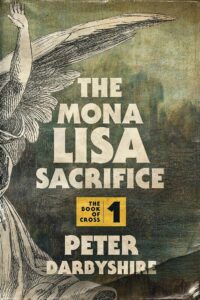Urban fantasy, mystery, and romp
The Mona Lisa Sacrifice
by Peter Darbyshire
Hamilton: Wolsak & Wynn, 2024
$24.00 / 9781998408054
Reviewed by Zoe McKenna
*

Cross is a lost soul, trapped in the body of Christ and on the hunt for the Mona Lisa. If he finds her, Cross has the chance to face off with his long-time enemy, Judas. Such is the premise for Peter Darybyshire’s The Mona Lisa Sacrifice. No, really!
Peter Darbyshire, an editor at the Vancouver Province and author of novels such as Please (2002), winner of the ReLit Award, and The Warhol Gang (2010). When exploring the more fantastical side of his imagination, Darbyshire has published under the pseudonym Peter Roman to distinguish his literary fiction from his genre fiction. While The Mona Lisa Sacrifice originally appeared in 2013 under the Peter Roman pen name, 11 years later the novel is back in print with Darbyshire proudly on the cover.
Cross is a restless soul who has walked the earth for two millennia, and has lived (and died) dozens of times. Across his lifetimes, Cross has participated in gladiator battles, killed countless angels, and fallen in love. Now, he’s been tasked with finding the Mona Lisa—not the painting in the Louvre, but rather the real Mona Lisa, a long-forgotten gorgon. Cross, an apathetic drunkard, is hardly motivated to pursue this mission, but “even angels have to make a living these days.” Plus, finding the Mona Lisa may lead Cross to Judas, a forgotten god who robbed Cross of his only love.
Cross is a sour protagonist, offering all of the dark humour and gritty countenance of a classic noir character. Large swaths of the novel are written in second person, and the direct “you” address makes Cross’s character all the more intense. Readers spend a lot of time up close and personal with Cross; the novel is written in a way that you can almost feel Cross’s stale breath against your ear as he leans in to tell sordid stories and lament his unfortunate luck.

Darbyshire aims to cut this intensity with Cross’s snide jokes. When Cross is cheeky, his jokes effectively cut the tension. At other times, his attempts at levity fall flat, failing to find the balance between dry wit, sarcasm, and genuine spitefulness.
What does serve to make Cross a more enjoyable protagonist is the romantic subplot peppered throughout the novel. Told in heartbreaking flashbacks, Cross reminisces about the love and loss of Penelope, his soulmate. Readers know this love is doomed from the beginning—Cross’s first mention of her name is tied up in tragedy: “I hated Judas more than I hated the angels for what he had done to Penelope.” Yet, Cross’s memories of Penelope are so warm in comparison to the rest of the novel that they serve to bring a sense of humanity to the inhuman protagonist.
As part of his mission to find the Mona Lisa, Cross enlists people he’s met throughout his lifetime—Alice in Wonderland, Morgana Le Fay, Princess Diana—the list goes on. Each person Cross meets brings him one step closer to the Mona Lisa, but not without resurfacing memories he’d rather forget.
The never-ending revolving door of characters that Cross encounters on his journey is truly that: never-ending. Almost every chapter introduces a new character, and while, in theory, each introduction is tenuously tied to the search for the Mona Lisa, much of the time these encounters feel like side stories. It’s easy to forget what Cross’s primary goal is as he digs into his history—for better or worse—with a cast of well-known figures.
The revolving-door, paired with the dark fantasy elements of the story, create a pacing that is reminiscent of old “monster of the week” television, à la Scooby Doo, or Doctor Who, without the levity that makes these shows so digestible. It’s in these moments that the novel’s genre-defiance is clearest—the novel is an urban fantasy, a mystery, and a romp through fiction and history. When it comes to genre, it would be easier to list the things that The Mona Lisa Sacrifice is not.
Ultimately, The Mona Lisa Sacrifice is what readers choose to make of it. If you go in with the hopes for a clean-cut fantasy novel or a truly dire noir mystery, you may be disappointed. If you’re in search of cerebral religious fiction or a fastidious historical drama, you may not find what you were looking for. With that said, if you come to The Mona Lisa Sacrifice willing to throw genre to the wind and go along for the ride, you may well have quite a bit of fun.

*

Zoe McKenna received a MA from the UVic and a BA from VIU. Her research focuses on horror writing, with a focus on stories by women. She was the Assistant Editor of That Witch Whispers and her writing has also appeared in Black Cat, The Malahat Review, and The Quill & Quire. When not at her desk, Zoe can be found haunting local bookstores and hiking trails. Find her on Twitter. Zoe gratefully acknowledges that she is a guest on the traditional territory of the Puneluxutth (Penelakut) Tribe and the hul’qumi’num speaking peoples. Find her on Twitter. [Editor’s note: Zoe McKenna has reviewed books by Richard Van Camp, Nalo Hopkinson, Marcus Kliewer, Ivana Filipovich, Giselle Vriesen, Scott Alexander Howard, S.W. Mayse, Linda Cheng, Paul Cresey, Michelle Min Sterling, Eve Lazarus, David Wallace, David Ly & Daniel Zomparelli, Sophie Sullivan, kc dyer, Robyn Harding, and Lindsay Cameron for BCR.]
*
The British Columbia Review
Interim Editors, 2023-25: Trevor Marc Hughes (non-fiction), Brett Josef Grubisic (fiction and poetry)
Publisher: Richard Mackie
Formerly The Ormsby Review, The British Columbia Review is an online book review and journal service for BC writers and readers. The Advisory Board now consists of Jean Barman, Wade Davis, Robin Fisher, Barry Gough, Hugh Johnston, Kathy Mezei, Patricia Roy, and Graeme Wynn. Provincial Government Patron (since September 2018): Creative BC. Honorary Patron: Yosef Wosk. Scholarly Patron: SFU Graduate Liberal Studies. The British Columbia Review was founded in 2016 by Richard Mackie and Alan Twigg.
“Only connect.” – E.M. Forster































One comment on “Urban fantasy, mystery, and romp”